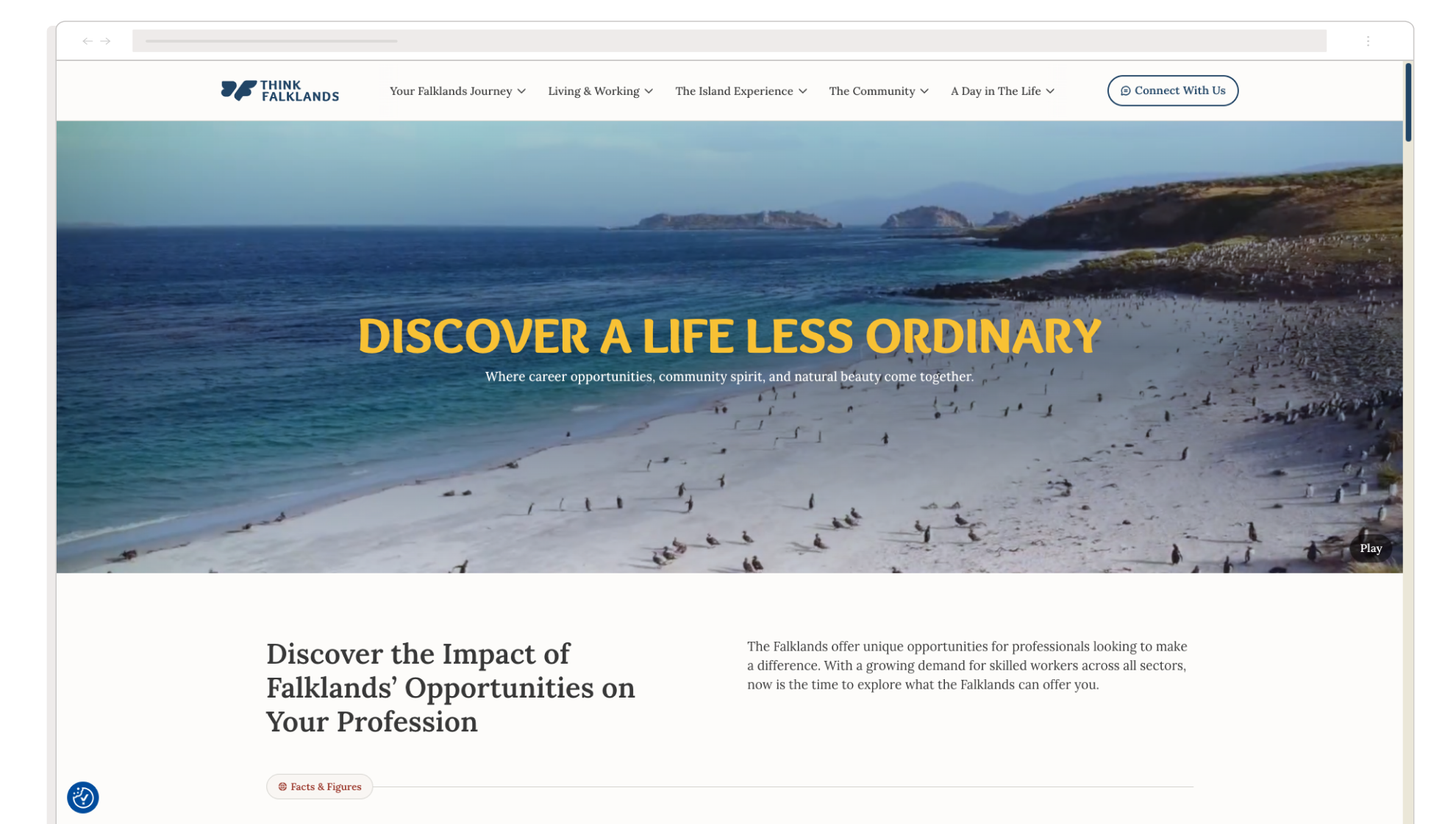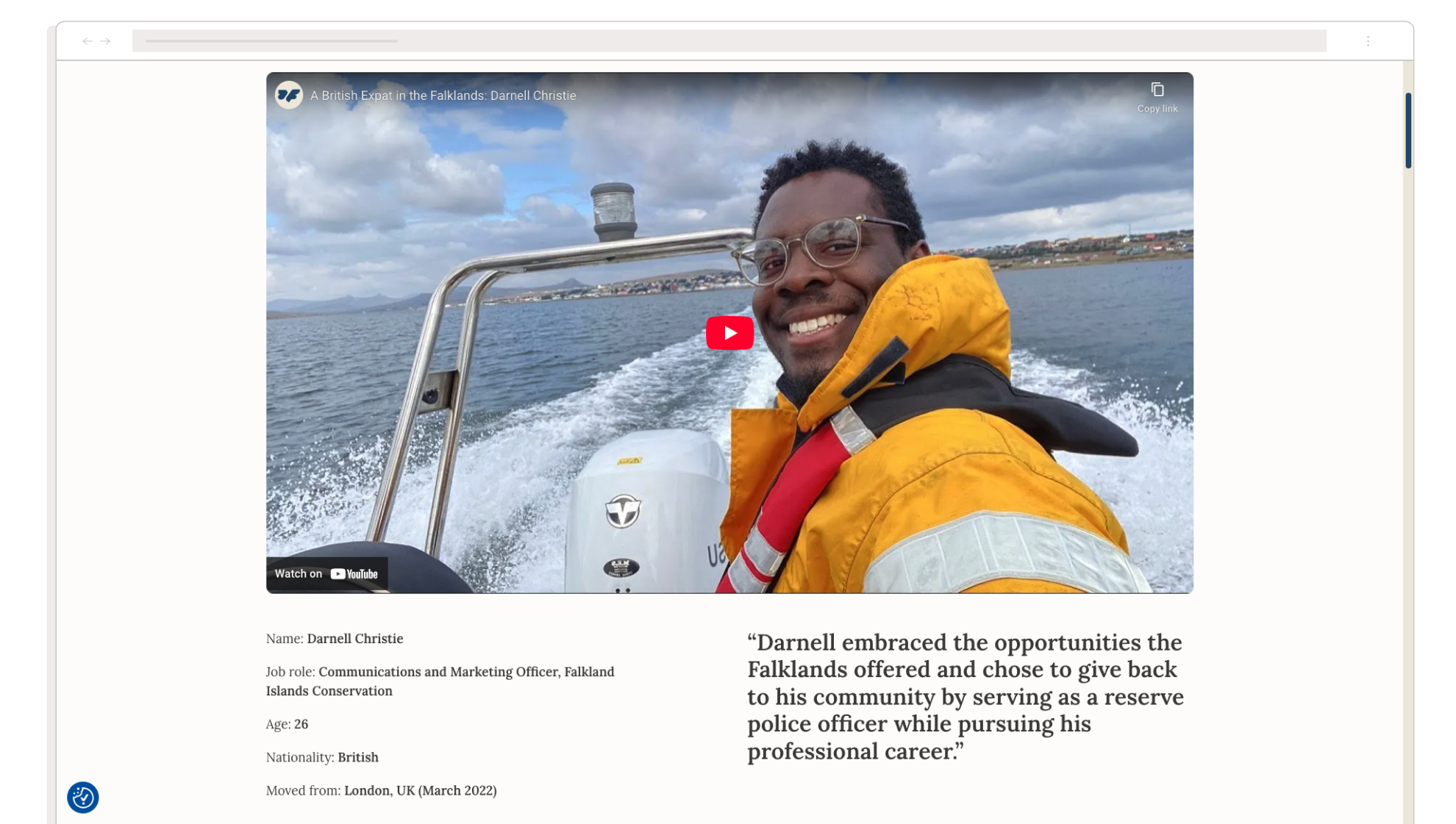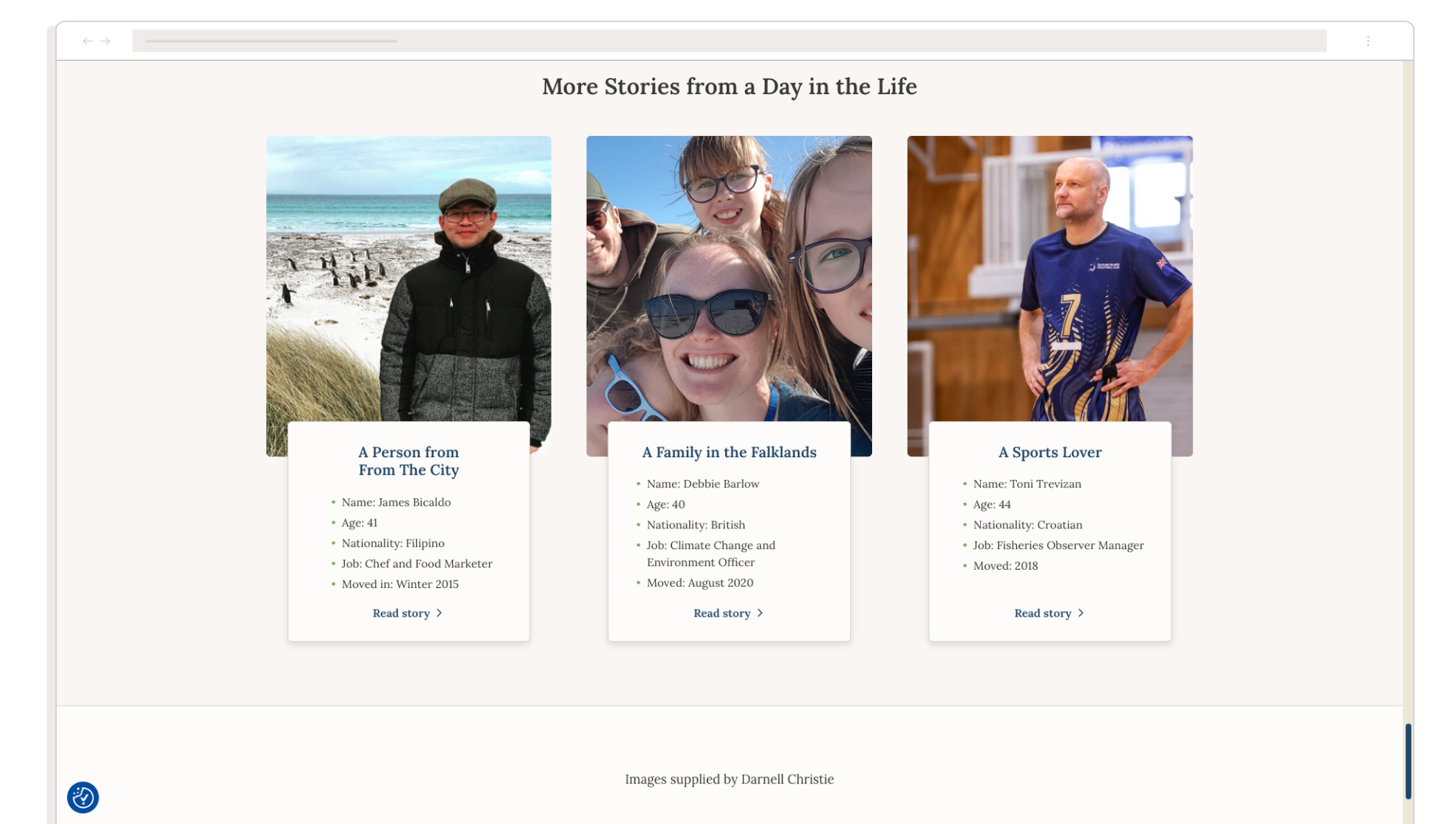Research, Strategy, Web Design and Development
Designing a Content-led Digital Gateway to Remote Island Living

The Falkland Islands Government operates one of the world’s most unique administrative challenges: governing a self-governing British Overseas Territory with a very small population. As the executive authority for the islands, the government manages everything from healthcare and education to telecommunications and infrastructure across 4,700 square miles of remote terrain.

Unlike typical government entities, the Falkland Islands Government functions more like a comprehensive community management organisation. With such a small population, every government role, from teachers and nurses to engineers and administrators, directly impacts community wellbeing and economic stability. This unique position creates extraordinary recruitment pressures. When a teacher leaves, there isn’t a pool of local candidates to replace them. When the telecommunications engineer relocates, specialised expertise must be sourced internationally. The government’s sustainability depends entirely on its ability to attract and retain skilled professionals who can adapt to island life while maintaining essential services that keep the community functioning.
With just 3,662 residents across 4,700 square miles, the islands maintained 95% employment while experiencing critical labour shortages. The job-to-applicant ratio averaged 3:1 across essential sectors, healthcare, education, telecommunications, and skilled trades, with some specialised roles remaining unfilled for over 18 months.
Ultimately, getting the right people into the right roles was an enormous challenge. They not only needed the right skillset, but also the right mindset. To help solve this, we had to ask: who would be willing to move, and why would they want to stay?
Research & Discovery
Our Methodology
We started by recruiting and conducting interviews with expats across the globe, successful re-locators with at least 18+ months residency who were living in similar circumstances, we did this to help understanding shared behavioral traits. These interviews explored pre-relocation circumstances, decision-making processes, lived reality versus expectations, and long-term satisfaction.
‘Jobs to be Done’ Framework analysis
Traditional role recruitment messaging was fundamentally misaligned with re-locator motivations. Successful candidates weren’t “hiring” the Falkland Islands to advance careers, they were solving deeper personal challenges.
Primary Job: “Help me escape the urban treadmill” surfaced as a common comment. We discovered that successful re-locators shared common frustration with urban professional life. They weren’t seeking career advancement; they were escaping competitive job markets, lengthy commutes, and anonymous city living that left them professionally insecure and personally unfulfilled. The Falklands weren’t competing against other job opportunities, they were competing against the status quo of urban stress.
Functional Jobs Hierarchy: Rather than climbing competitive ladders, we found that re-locators wanted to become essential contributors where their expertise was valued. The Falklands’ challenge of unfilled jobs became a recruitment advantage, guaranteed immediate employment and job stability in a community where every professional is essential.

Reclaim daily life from commute stress: Urban professionals felt their days were consumed by travel. Five-minute walks to work became daily luxuries, with commute elimination significantly improving quality of life.
Transform social connection: Despite being surrounded by millions, city professionals felt socially isolated. The Falklands’ small population made community engagement necessary for integration, creating personal connections impossible in larger communities.
The Anti-Jobs: To summarise it, we ultimately found that what re-locators were avoiding was largely broken down into four points:
• Anonymous urban living within a large city
• Competitive job markets that ask more than they give
• Long commutes consuming personal time
• Too separated from nature
Strategic Approach
The research revealed that the islands weren’t selling jobs, they were selling solutions to fundamental dissatisfaction with modern urban life. This insight drove a ‘screening over selling strategy’ designed to attract compatible candidates while discouraging those likely to struggle.
The question now was, how do we transform all of this data into a strategic roadmap to inform the design and content. To do this, we organised a series of collaborative workshops alongside the Falkland Islands Government stakeholders, and our content partners Momo Media, we then used the ‘Go-To-Market Strategy‘ which allowed us all to discuss and explore the design options and iron-out the content approach.

The Core Principles
We focused on three core principles that were unique to island living, with some of them specific to living in the Falkland Islands.
Persuasion via Transparency: Content honestly portrayed island realities, commitment to community engagement, adaptation to imported food supplies, creative problem-solving during connectivity issues, and acceptance of limited entertainment options. Rather than minimising facts such as the 300:1 penguin-to-people ratio or challenging weather, content positioned these as distinctive advantages for individuals seeking extraordinary experiences.

Connection Priority: The strategy emphasised joining a community, not just filling roles. Whilst professional opportunities sparked interest, content prioritised social connection and community integration for long-term success. The focus shifted from attracting skilled professionals to retaining them beyond initial contracts.
Authentic Storytelling Framework: Every promotional piece featured genuine resident accounts, including both positive experiences and honest transition challenges. Job descriptions were embedded within comprehensive lifestyle portraits, helping candidates understand how professional roles integrated into broader island living.

Design & Implementation
Content Architecture: We created a progressive disclosure system guiding candidates through increasingly detailed information. Initial pages focused on lifestyle compatibility, with job-specific information presented only after candidates demonstrated serious interest through community-focused content engagement.
Content Delivery System: Alongside Momo Media we developed a four-phase framework for future content delivery:
- Emotional connection through visual storytelling and testimonials
- Practical realities including housing, transportation, and logistics
- Professional opportunities within community context
- Application process with built-in compatibility assessment

User Experience Design: Every design decision was guided by our understanding of user intent, ensuring that content was surfaced in a way that aligned directly with what users came looking for. The experience was carefully structured to aid discoverability by search engines, while also guiding visitors through a narrative that felt like a story rather than a static set of pages. We deliberately sequenced the journey to answer common questions as they naturally arose, creating a sense of progression and reassurance that encouraged users to explore deeper and remain engaged.

User Interface Design: Working with brand guidelines developed by our content partner Momo Media, we expanded the system into a set of bespoke UI components designed specifically for the project. These components reflected the tone and pace of the subject matter, balancing clarity with a distinctive visual identity. We sought inspiration from competitor islands and organisations with similar values, such as the UK’s National Trust, ensuring the interface conveyed both trustworthiness and character. The result was a visual language that felt unique to the project, while remaining consistent with the broader brand identity.

Technical Considerations: We implemented a simple, easy-to-use CMS with a comprehensive templating system, and that supported multi-user access and content authorisation. This ensured that content could be created, reviewed, and published efficiently without technical barriers. We structured workflows so that both our partners at Momo Media and representatives from the Falkland Islands Government had the necessary access and control to manage ongoing content creation. In doing so, we established a sustainable publishing process that allowed for continuous content delivery and communications management, ensuring the platform could remain current and engaging through to 2027.
The Outcome
Success lies not in increased applications but in relocated professional retention rates. The fundamental issue was never attracting people, it was ensuring they stayed and thrived after arrival.
The Think Falklands platform transformed recruitment from transactional process into community-building initiative. By prioritising cultural fit alongside professional qualifications, the government created a sustainable model for maintaining essential services whilst strengthening community cohesion.
Broader Impact The project demonstrates that successful remote territory recruitment requires abandoning traditional marketing for authentic, transparent community invitation. When candidates understand exactly what they’re choosing, both challenges and unique rewards, they arrive prepared to contribute meaningfully rather than simply enduring until contract completion.
The ultimate success metric won’t be an uptick in application numbers, but those professionals that successfully integrate into their new roles and new Falkland Island life.
If you’re intrigued about island living, take a look at what Darnell has to say in his ‘A Day in the Life’ story below. Of course you can also check out the full website at thinkfalklands.com for more information.